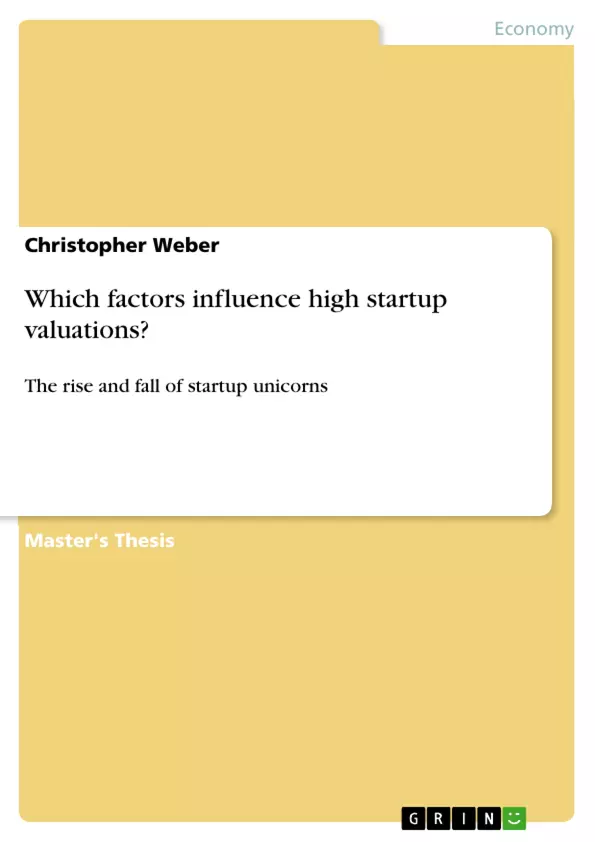The author of the work aims to shed light on processes in the startup environment. The work provides a new and more comprehensive view on the valuation drivers of startups by including the dynamics of negotiation during the actual valuation process. The three areas that this work seeks to investigate are: What are the factors that impact the valuation of a startup, especially relating to startup unicorns? Which factors increase the likelihood that a highly valued startup is engaging in a down-round? Which factors are the most important valuation drivers of a startup in each stage of its development?
The valuation of a startup results out of a highly complex interplay of different factors which can be assigned to the four dimensions valuation methods and down-rounds, the ecosystem, the startup, and the investor. The author iterviewed active startup investors and entrepreneurs and collected hands-on knowledge from professionals directly involved in the negotiation process.
Inhaltsverzeichnis (Table of Contents)
- Abstract
- Table of Contents
- List of Tables
- List of Figures
- Introduction
- Theory
- Literature and definitions
- How the literature evolved
- Focus areas
- Definitions
- Ecosystem
- Geographic characteristics
- Trends
- Target audience
- Talent funnel
- Startup and unicorn
- Startup
- Unicorn
- Investor
- Venture capital
- Corporate investors
- Valuation methods and down-rounds
- General trends and recognized limitations
- The use of traditional valuation methods in venture capital
- Down-rounds
- Endnote theory
- Literature and definitions
- Methodology
- Study design
- Sample selection
- The interviews
- Findings
- Analysis of the interviews
- Interview A
- Interview B
- Interview C
- Interview D
- Interview E
- Clustering factors
- Overview table
- Ecosystem factors
- Startup factors
- Investor factors
- Valuation methods and down-rounds factors
- Analysis of the interviews
- Discussion
- Contrasting the literature with the interviews
- Comparing ecosystem factors
- Comparing startup factors
- Comparing investor factors
- Comparing valuation methods and down-rounds factors
- Implications
- The ideal unicorn aspirant, which factors have the highest impact at what time
- Founding stage
- Initial financing stage
- Later stages and exit
- Limitations
- Future research
- Contrasting the literature with the interviews
Zielsetzung und Themenschwerpunkte (Objectives and Key Themes)
The primary objective of this master's thesis is to investigate the complex factors influencing the valuation of startup companies, particularly those that achieve "unicorn" status, with a valuation exceeding $1 billion. The thesis explores the intricate interplay of valuation methods, ecosystem dynamics, startup characteristics, and investor behavior. Through a comprehensive literature review and interviews with active startup investors and entrepreneurs, the work aims to identify key valuation drivers and their impact on the ultimate value achieved during investment rounds.
- The influence of valuation methods and down-rounds on startup valuations.
- The role of the ecosystem in fostering startup growth and valuations.
- Key factors specific to the startup itself that contribute to its valuation.
- The impact of investor strategies and preferences on startup valuations.
- The emergence and significance of negotiation dynamics in shaping final valuations.
Zusammenfassung der Kapitel (Chapter Summaries)
The thesis begins by providing a comprehensive review of the existing literature on startup valuation. It examines the evolution of the research field, identifies key focus areas, and defines relevant terms. Chapter 2 delves into the ecosystem surrounding startups, exploring geographic characteristics, industry trends, target audience, and talent availability. The chapter then focuses on startups themselves, defining what constitutes a "unicorn" and analyzing its key attributes. Chapter 3 introduces the role of investors in startup valuations, examining venture capital and corporate investment strategies. Chapter 4 explores various valuation methods and their limitations in the context of venture capital. Finally, the thesis explores the concept of down-rounds, their causes, and their potential impact on startup valuations. This chapter concludes with an analysis of the data collected through expert interviews, highlighting key findings and insights.
The discussion section analyzes the data collected from the expert interviews, contrasting it with existing literature and highlighting the key differences and new insights. It also examines the implications of the findings, particularly for entrepreneurs aiming to build a unicorn startup. This section includes a comprehensive overview of the most relevant valuation drivers at different stages of a startup's development.
Schlüsselwörter (Keywords)
Startup valuation, unicorn, venture capital, ecosystem, down-rounds, negotiation dynamics, investment rounds, valuation methods, expert interviews, growth stage, business model, investor strategies.
- Arbeit zitieren
- Christopher Weber (Autor:in), 2018, Which factors influence high startup valuations?, München, GRIN Verlag, https://www.grin.com/document/496056



